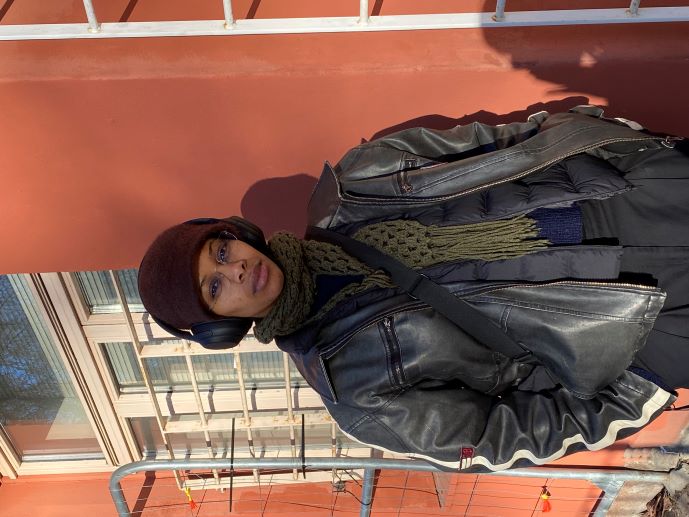About the thesis
Title: Minoriserte subjekter av begjær: Identitetsforståelse blant skeive personer med minoritetsbakgrunn i Norge [Minoritized Subjects of Desire: Understandings of Identity Among Queer People with Minority Backgrounds in Norway]
Submitted to: The Centre for Gender Research, UiO
Nominated by: Supervisor Kristin Engh Førde
Jury members: Eirinn Larsen, Sadik Qaka, Sara E.S. Orning
The thesis considers how queer people with minority backgrounds in Norway use language to create and understand their identity.
Through interviews and analyses informed by queer theory and postcolonial theory, Gebrelul has focused on how the group understands and uses the terms “queer” [“skeiv”] and “minority” [“minoritet”]. Did the informants see themselves in these words? In what ways might these terms be experienced as for instance alienating, or meaningful?
The aim of the study was not to provide simple answers to such questions, but rather to create a framework that gives space to the thoughts and experiences of the informants. In this way, the thesis provides insight into the experiences of people who are seldom allowed to speak within the context of research.
The nomination from Gebrelul’s supervisor and the jury’s justification both emphasize the student’s awareness of the complexity of their material, and the ethical and methodological challenges inherent to the project. The jury especially commends Gebrelul for using their own background and experiences in a thoughtful, ethical, and productive way in the thesis.
Inspired by their own network

Gebrelul says that the idea behind the thesis came from their own everyday life and social circle:
–I have been inspired by my own queer network for a long time. I was interested in the creative ways in which they break with conventional norms relating to gender and sexuality, and how they participate in society in ways that allow them to express these different ways of being.
Through their studies at STK, the student became aware of the fact that Norwegian research on the experiences of queer people of colour often focused on structural discrimination, both at home and in society at large.
This image did not match Gebrelul’s own understanding of how they and their friends related to themselves, one another, and the rest of the world. They wanted to provide a more nuanced picture of the perspectives and experiences of queer people with minority backgrounds:
–It became important to me to find a way to represent this group which dealt with the challenges they experience, but that also showed how they saw themselves, and that this self-understanding isn’t necessarily affected by the discrimination they encounter. I saw this as an opportunity to make visible a group of people that are often underrepresented in Norwegian research, Gebrelul explains.
Using their own words
The goal of bringing underrepresented voices to the fore is reflected in Gebrelul’s choice of methodology. They conducted six semi-structured interviews, in which the focus point was the informants’ own understandings of who they are.
–Given that I wanted the thesis to provide insight into the ways in which queer people with minority backgrounds navigate and understand their identity, I chose to do a qualitative study, which would give me a starting point that would be as representative as possible. It was imperative to let this group use their own words to describe their own perspectives on society, and their place in it. I believe that this data material is a valuable addition to Norwegian research on this topic, they explain.
Gebrelul’s own closeness to their thesis topic was a benefit, but also a challenge in the interviews:
–In many ways it was helpful, as it seemed to me that the people I was interviewing were open with me as a researcher. At the same time, I became aware that some information might get «lost in translation», as the informants sometimes assumed that I understood their perspective.
This meant that Gebrelul had to adjust their interview methods as they went along, to take into account these complex dynamics.
Postcolonial perspectives
In the thesis, Gebrelul analyzes their interview material using queer and postcolonial theory. The postcolonial perspectives have been particularly central to the project:
–It became important to me that postcolonial theory should feature strongly in the thesis, as I understood many of the challenges that the informants described as being consequences of colonialism, they explain.
This theoretical framework has also impacted Gebrelul’s understanding of knowledge production, and their own role as a researcher. Gayatri Spivak is among the postcolonial thinkers that the thesis draws on. Spivak focuses on how and to what extent people who are subjugated or oppressed can act as speaking subjects in an academic context. How can one as a researcher avoid talking “over” or “on behalf of” marginalized voices?
“Queer” and “minority” as terms that create community
By letting the informants tell their own stories, the thesis shows some trends in how the terms “queer” and “minority” are used and understood within this group.
Gebrelul demonstrates that “queer” is an elastic term, which is used to describe opposition to that which is normative. “Queer” refers to a break with heterosexual norms, but can also describe other ways of being different. This flexibility made the term especially useful to the informants and created a sense of belonging.
The uses and understandings of “minority” were more varied. For informants who had one parent with a Norwegian majority background and one parent with a minority Norwegian background, it could be difficult to recognize oneself in that term.
At the same time, the informants who grew up with a minority background described that this had given them a sense of community, both within their own family and with others with minority backgrounds.
«Queer» and «minority» were therefore both terms that could be seen as creating community, from the perspective of the informants.
These findings show that queer people with minority backgrounds do not define their identity in terms of othering or oppression. The informants were aware of the challenges they face, but emphasized the possibility of creativity and community within the available range of terms.
Opening up for complexity
Ultimately, the thesis shows how complex the identity work of queer people with minority backgrounds in Norway can be. Being able to bring out these underrepresented, complicated experiences was a finding in itself for Gebrelul:
–Discovering a way to open up for complexity when we’re talking about queer people with minority backgrounds was one of the most important findings for me. Not just for the group that was represented in the thesis, but also in general when we’re talking about the challenges faced by marginalized groups.
–It was important to give space to contradictory findings in a way that creates meaning and can be analyzed. That was also something that surprised me: that the informants could express and describe so much assuredness in, and at the same time ambivalence about, their own identity. They had a critical and thoughtful attitude towards their own place in society that was very impressive, Gebrelul explains.
Combining art, theory and practice
Now that they have completed their studies at STK, Gebrelul is continuing in their position as exhibition manager and curator at Fotogalleriet in Oslo:
–The thesis really overlaps with what we do at Fotogalleriet, so it will be exciting to keep working in the intersection between the artistic and the practical. Other than that, I hope I can keep working with theoretical perspectives!
